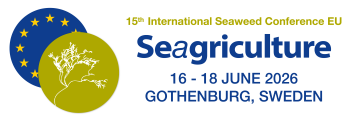About the speaker:
Isa S.A. Hiemstra obtained both her BSc and MSc in Biotechnology at Wageningen University & Research (WUR, The Netherlands), with a BSc minor at the University of Limerick (Ireland). Currently, Isa is a PhD candidate within the Bioprocess Engineering chair group at WUR. Within her PhD, she is focusing on designing switchable green deep eutectic solvents (DES) for the extraction of bioactive compounds from macroalgal biomass and the regeneration and recycling of DES.
Company info:

Chair group Bioprocess Engineering (BPE) from Wageningen University & Research teaches and develops innovative bio-based processes. They work on a sustainable and healthy future by engineering efficient bioprocesses for high quality products. Bioprocess Engineering studies and develops photoautotrophic and heterotrophic production systems for biobased products, as well as high-quality processes for the production of biopharmaceuticals. Within Bioprocess Engineering, the Biorefinery group aims to develop mild fractionation and separation processes that enable them to obtain a plethora of valuable biomolecules from biomass (e.g. microalgae, seaweed and agri-food residues). By taking cell disentanglement, mild extraction/separations, process design and product functionality into account they are developing multi-product biorefinery concepts with a positive economic value and ecological impact.
Presentation:
Brown seaweeds are a rich source of valuable compounds like alginate, fucoidan, laminarin, and pigments. Yet, their highly variable composition and the need for multiproduct recovery pose challenges for standard processing. This presentation explores the concept of a tuneable biorefinery; a flexible, adaptive approach to sequentially extract multiple products without compromising quality. They highlight key processing strategies, examples of component-preserving extractions, and current research gaps in selective, mild, and integrated processes. Advancing such systems is essential for efficient seaweed valorisation and sustainable bioeconomy development.



